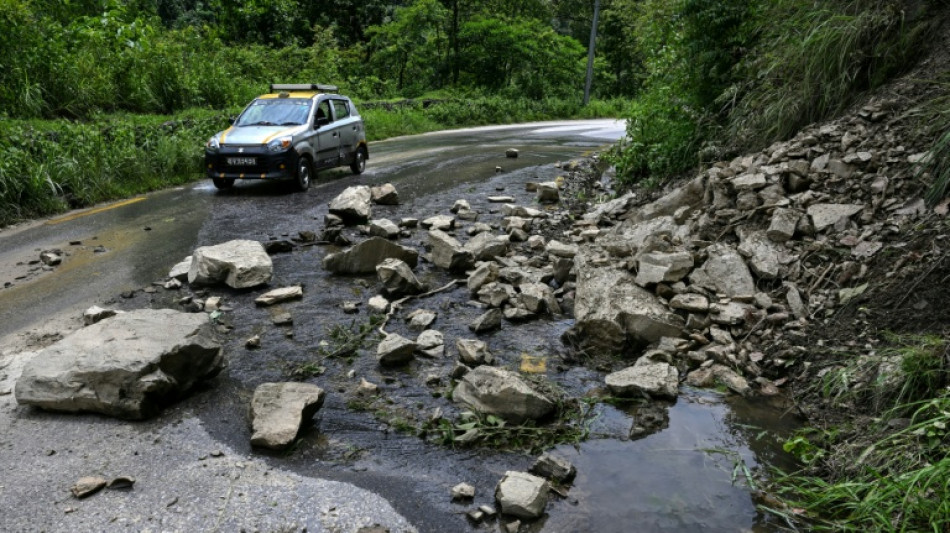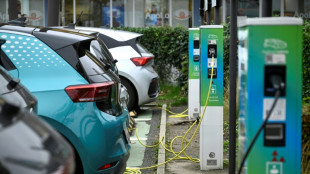
-
 'Extremely lucky' Djokovic into Melbourne semi-finals as Musetti retires
'Extremely lucky' Djokovic into Melbourne semi-finals as Musetti retires
-
'Animals in a zoo': Players back Gauff call for more privacy

-
 Starmer heads to China to defend 'pragmatic' partnership
Starmer heads to China to defend 'pragmatic' partnership
-
Uganda's Quidditch players with global dreams

-
 'Hard to survive': Kyiv's elderly shiver after Russian attacks on power and heat
'Hard to survive': Kyiv's elderly shiver after Russian attacks on power and heat
-
South Korea's ex-first lady jailed for 20 months for taking bribes

-
 Polish migrants return home to a changed country
Polish migrants return home to a changed country
-
Dutch tech giant ASML posts bumper profits, eyes bright AI future

-
 South Korea's ex-first lady jailed for 20 months for corruption
South Korea's ex-first lady jailed for 20 months for corruption
-
Minnesota congresswoman unbowed after attacked with liquid

-
 Backlash as Australia kills dingoes after backpacker death
Backlash as Australia kills dingoes after backpacker death
-
Brazil declares acai a national fruit to ward off 'biopiracy'

-
 Anisimova 'loses her mind' after Melbourne quarter-final exit
Anisimova 'loses her mind' after Melbourne quarter-final exit
-
Home hope Goggia on medal mission at Milan-Cortina Winter Olympics

-
 Omar attacked in Minneapolis after Trump vows to 'de-escalate'
Omar attacked in Minneapolis after Trump vows to 'de-escalate'
-
Pistons escape Nuggets rally, Thunder roll Pelicans

-
 Dominant Pegula sets up Australian Open semi-final against Rybakina
Dominant Pegula sets up Australian Open semi-final against Rybakina
-
'Animals in a zoo': Swiatek backs Gauff call for more privacy

-
 Japan PM's tax giveaway roils markets and worries voters
Japan PM's tax giveaway roils markets and worries voters
-
Amid Ukraine war fallout, fearful Chechen women seek escape route

-
 Rybakina surges into Melbourne semis as Djokovic takes centre stage
Rybakina surges into Melbourne semis as Djokovic takes centre stage
-
Dollar struggles to recover from losses after Trump comments

-
 Greenland blues to Delhi red carpet: EU finds solace in India
Greenland blues to Delhi red carpet: EU finds solace in India
-
Will the EU ban social media for children in 2026?

-
 Netherlands faces 'test case' climate verdict over Caribbean island
Netherlands faces 'test case' climate verdict over Caribbean island
-
Rybakina stuns Swiatek to reach Australian Open semi-finals

-
 US ouster of Maduro nightmare scenario for Kim: N. Korean ex-diplomat
US ouster of Maduro nightmare scenario for Kim: N. Korean ex-diplomat
-
Svitolina credits mental health break for reaching Melbourne semis

-
 Japan's Olympic ice icons inspire new skating generation
Japan's Olympic ice icons inspire new skating generation
-
Safe nowhere: massacre at Mexico football field sows despair

-
 North Korea to soon unveil 'next-stage' nuclear plans, Kim says
North Korea to soon unveil 'next-stage' nuclear plans, Kim says
-
French ex-senator found guilty of drugging lawmaker

-
 US Fed set to pause rate cuts as it defies Trump pressure
US Fed set to pause rate cuts as it defies Trump pressure
-
Sleeping with one eye open: Venezuelans reel from US strikes

-
 Venezuela's acting president says US unfreezing sanctioned funds
Venezuela's acting president says US unfreezing sanctioned funds
-
KPop Demon Hunters star to open Women's Asian Cup

-
 Trump warns of 'bad things' if Republicans lose midterms
Trump warns of 'bad things' if Republicans lose midterms
-
Russian strikes in Ukraine kill 12, target passenger train

-
 With Maduro gone, Venezuelan opposition figure gets back to work
With Maduro gone, Venezuelan opposition figure gets back to work
-
Celebrities call for action against US immigration raids

-
 Rubio to warn Venezuela leader of Maduro's fate if defiant
Rubio to warn Venezuela leader of Maduro's fate if defiant
-
Denver QB Nix 'predisposed' to ankle injury says coach

-
 Lula, Macron push for stronger UN to face Trump 'Board of Peace'
Lula, Macron push for stronger UN to face Trump 'Board of Peace'
-
Prass stunner helps Hoffenheim go third, Leipzig held at Pauli

-
 Swiss Meillard wins final giant slalom before Olympics
Swiss Meillard wins final giant slalom before Olympics
-
CERN chief upbeat on funding for new particle collider

-
 Trump warns US to end support for Iraq if Maliki returns
Trump warns US to end support for Iraq if Maliki returns
-
Judge reopens sexual assault case against goth rocker Marilyn Manson

-
 South Korea's ex-first lady to learn verdict in corruption case
South Korea's ex-first lady to learn verdict in corruption case
-
Rosenior dismisses Chelsea exit for 'untouchable' Palmer


Landslide-prone Nepal tests AI-powered warning system
Every morning, Nepali primary school teacher Bina Tamang steps outside her home and checks the rain gauge, part of an early warning system in one of the world's most landslide-prone regions.
Tamang contributes to an AI-powered early warning system that uses rainfall and ground movement data, local observations and satellite imagery to predict landslides up to weeks in advance, according to its developers at the University of Melbourne.
From her home in Kimtang village in the hills of northwest Nepal, 29-year-old Tamang sends photos of the water level to experts in the capital Kathmandu, a five-hour drive to the south.
"Our village is located in difficult terrain, and landslides are frequent here, like many villages in Nepal," Tamang told AFP.
Every year during the monsoon season, floods and landslides wreak havoc across South Asia, killing hundreds of people.
Nepal is especially vulnerable due to unstable geology, shifting rainfall patterns and poorly planned development.
As a mountainous country, it is already "highly prone" to landslides, said Rajendra Sharma, an early warning expert at the National Disaster Risk Reduction and Management Authority.
"And climate change is fuelling them further. Shifting rainfall patterns, rain instead of snowfall in high altitudes and even increase in wildfires are triggering soil erosion," Sharma told AFP.
- Saving lives -
Landslides killed more than 300 people last year and were responsible for 70 percent of monsoon-linked deaths, government data shows.
Tamang knows the risks first hand.
When she was just five years old, her family and dozens of others relocated after soil erosion threatened their village homes.
They moved about a kilometre (0.6 miles) uphill, but a strong 2015 earthquake left the area even more unstable, prompting many families to flee again.
"The villagers here have lived in fear," Tamang said.
"But I am hopeful that this new early warning system will help save lives."
The landslide forecasting platform was developed by Australian professor Antoinette Tordesillas with partners in Nepal, Britain and Italy.
Its name, SAFE-RISCCS, is an acronym of a complex title -- Spatiotemporal Analytics, Forecasting and Estimation of Risks from Climate Change Systems.
"This is a low-cost but high-impact solution, one that's both scientifically informed and locally owned," Tordesillas told AFP.
Professor Basanta Adhikari from Nepal's Tribhuvan University, who is involved in the project, said that similar systems were already in use in several other countries, including the United States and China.
"We are monitoring landslide-prone areas using the same principles that have been applied abroad, adapted to Nepal's terrain," he told AFP.
"If the system performs well during this monsoon season, we can be confident that it will work in Nepal as well, despite the country's complex Himalayan terrain."
In Nepal, it is being piloted in two high-risk areas: Kimtang in Nuwakot district and Jyotinagar in Dhading district.
- Early warnings -
Tamang's data is handled by technical advisers like Sanjaya Devkota, who compares it against a threshold that might indicate a landslide.
"We are still in a preliminary stage, but once we have a long dataset, the AI component will automatically generate a graphical view and alert us based on the rainfall forecast," Devkota said.
"Then we report to the community, that's our plan."
The experts have been collecting data for two months, but will need a data set spanning a year or two for proper forecasting, he added.
Eventually, the system will deliver a continuously updated landslide risk map, helping decision makers and residents take preventive actions and make evacuation plans.
The system "need not be difficult or resource-intensive, especially when it builds on the community's deep local knowledge and active involvement", Tordesillas said.
Asia suffered more climate and weather-related hazards than any other region in 2023, according to UN data, with floods and storms the most deadly and costly.
And while two-thirds of the region have early warning systems for disasters in place, many other vulnerable countries have little coverage.
In the last decade, Nepal has made progress on flood preparedness, installing 200 sirens along major rivers and actively involving communities in warning efforts.
The system has helped reduce flooding deaths, said Binod Parajuli, a flood expert with the government's hydrology department.
"However, we have not been able to do the same for landslides because predicting them is much more complicated," he said.
"Such technologies are absolutely necessary if Nepal wants to reduce its monsoon toll."
F.Wagner--VB



